Rewriting the rules: These states have passed new voting laws this year. Here's how they could affect 2024
WASHINGTON − A slate of new voting laws launched in states throughout the past year could serve as a preview for how changes to ballot access may offset the outcome of the 2024 general election, voting rights experts say.
These laws − some expanding rights for voters and other making it more difficult to participate in the election process − are taking place in key battleground states across the U.S. that Democrats and Republicans are targeting in an effort to turn the tide in their favor.
More than 40 states have passed new voting laws so far this year that will be in effect for the 2024 general election.
At least 14 states enacted laws that will make it harder to vote, according to an October 2023 roundup of voting laws from the Brennan Center. More restrictive laws have been enacted in 2023 than in the past decade, excluding a wave of changes in 2021 after the last presidential election.
Separately, nearly half of all states passed legislation that will make it easier to vote. The Brennan Center estimates there has been nearly three new expansive laws enacted for every restrictive law, marking the biggest ratio since 2020.
"We're seeing a very stark divide between states that are actively making it harder to vote and then states that are aiming to expand voting access," Sara Carter, an attorney in the Brennan Center's Democracy Program, told USA TODAY. "Expansive and restrictive voting laws are being passed all the time and they don't simply cancel each other out, particularly when they're being passed in different states."
A post-2020 landscape
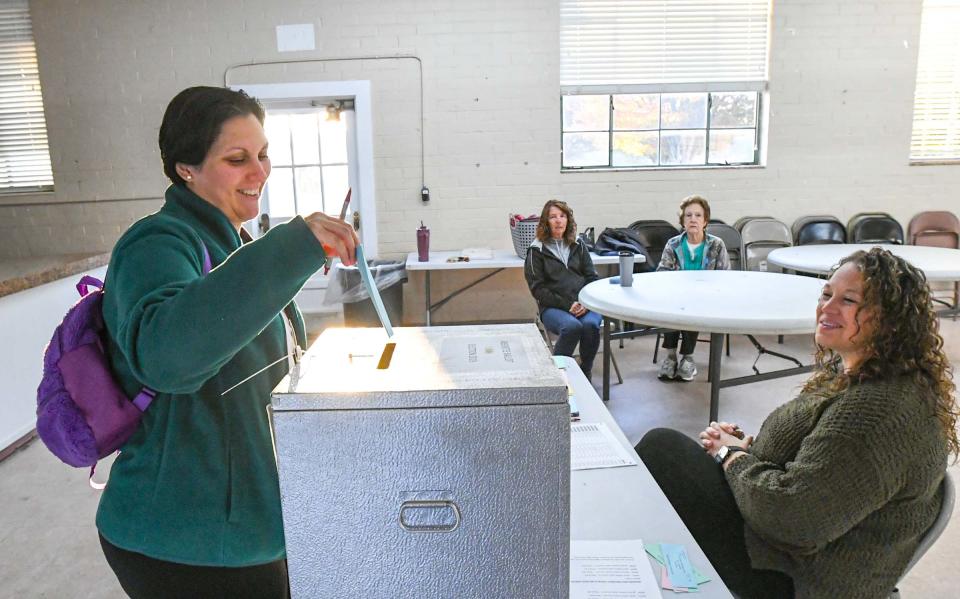
The last presidential election fell at an unusual time: The middle of a global pandemic.
Almost every state adjusted their voting systems to expand access to mail-in and early voting to make the voting process safer. But since the 2020 election, in part from the efforts of former President Donald Trump to overturn the election results, many states reversed such legislation and rewrote election laws, according to Liz Avore, the senior policy adviser for the Voting Rights Lab, a voter advocacy organization.
"Since the 2020 election, lawmakers have rewritten – and in some cases, continue to rewrite – the rules that govern our elections and democracy," she said. "For the swing states that will determine the outcome of next year's presidential election, those changes could ultimately tip the scales."
According to a report from the Voting Rights Lab, which Avore authored, over 560 new laws governing elections are in effect since 2020.
The report analyzed new voting policy changes over the past three years with a focus on eight competitive presidential swing states − Wisconsin, Nevada, Arizona, Michigan, Pennsylvania, North Carolina, Georgia and New Hampshire.
In two states − Nevada and Michigan − voters will have more access in the 2024 general election. But in four − Georgia, New Hampshire, North Carolina and Wisconsin − voters face new restrictions.
14 states pass more restrictive laws in 2023
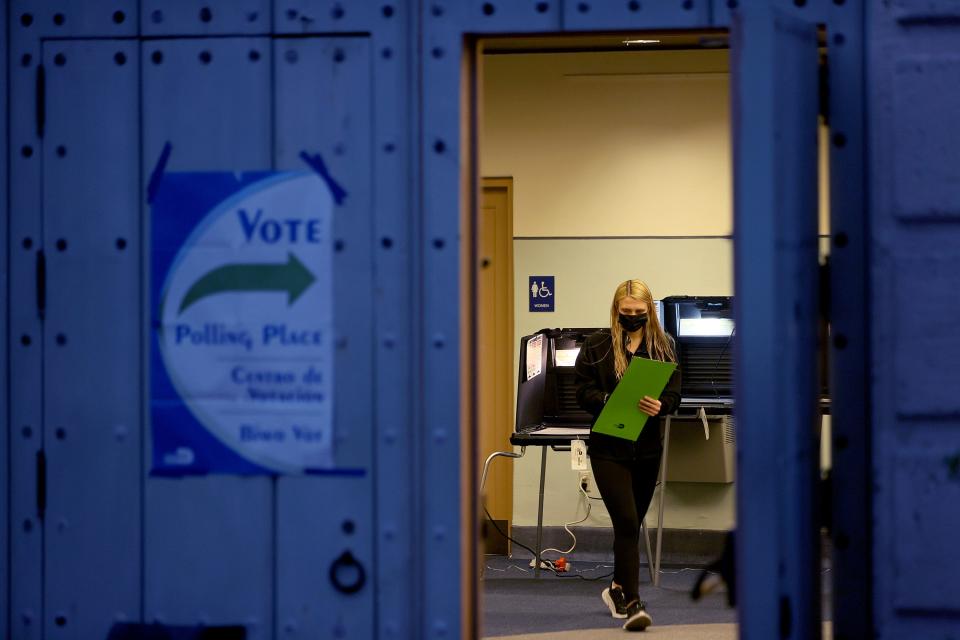
Fourteen states in 2023 passed legislation that makes it harder to vote − many in states where voters already face difficulties casting a ballot. These laws will be in effect for the 2024 general election.
New laws target voter registration, mail-in voting and enforce stricter voter ID laws − all provisions that specifically burden voters of color, the Brennan Center's Carter said.
One law passed in Texas this year changes provisions for consolidating polling places in counties throughout the state, which the Brennan Center predicts could increase wait times at the polls. Another law grants the secretary of state oversight of Harris County’s election administration, a county where Republicans alleged voter fraud in 2020.
North Carolina also passed its own package of several restrictive voting bills and election interference laws this year.
The state Legislature overrode the governor's veto of the package that shortens the window to return mail-in ballots, bans the use of ballot drop boxes and weakens the governor's oversight of elections.
This package of laws could potentially tee up disputes over election certification within boards of elections, which could give more power to partisan state lawmakers or potentially the courts to solve disputes, Carter said.
States that passed restrictive voting laws this year mark the homes of several races where candidates won by narrow majorities in 2022 that both Democrats and Republicans are watching closely in the leadup to 2024.
Republicans, looking to gain more power in the House, have identified several seats in these states as pick-up opportunities, including one currently held by Texas Democratic Rep. Vicente Gonzalez, who won by 11,000 votes.
Also in Texas, the campaign arm for House Democrats is looking to flip the seat of Republican Rep. Monica De La Cruz, a Trump-backed candidate who won last year with a 10-point margin. They are also eyeing two Florida seats to win back the House currently held by Republican Reps. Anna Paulina Luna and Maria Elvira Salazar.
The GOP is also looking to flip one seat in North Carolina − where recent redistricting has redrawn districts in favor of Republicans − held by Democratic Rep. Don Davis who won in 2022 by just 5 points.
States target voter mobilization

One recurrence among recent restrictive election laws has been targeting get-out-the-vote organizations that are helping voters participate in the election process, according to Sophia Lin Lakin, director of ACLU’s Voting Rights Project.
In Florida, Republican presidential candidate Gov. Ron DeSantis signed a voting law that imposes new requirements on third-party organizations working to register voters and bans noncitizens from collecting voter registration forms, among additional provisions. It also prohibits third-party mobilization organizations from retaining personal voter information.
A judge temporarily blocked the legislation and the state has since appealed.
Lakin said she has seen a shift with restrictive voting laws targeting efforts and fining organizations that help voters through the election. This is in response to the success of get-out-the-vote groups that are helping voters overcome barriers put in place after the 2020 election, she said.
"It's truly devastating that these groups are providing that service in a lot of instances to help voters navigate what can be a really difficult process," she said.
Ties to election deniers
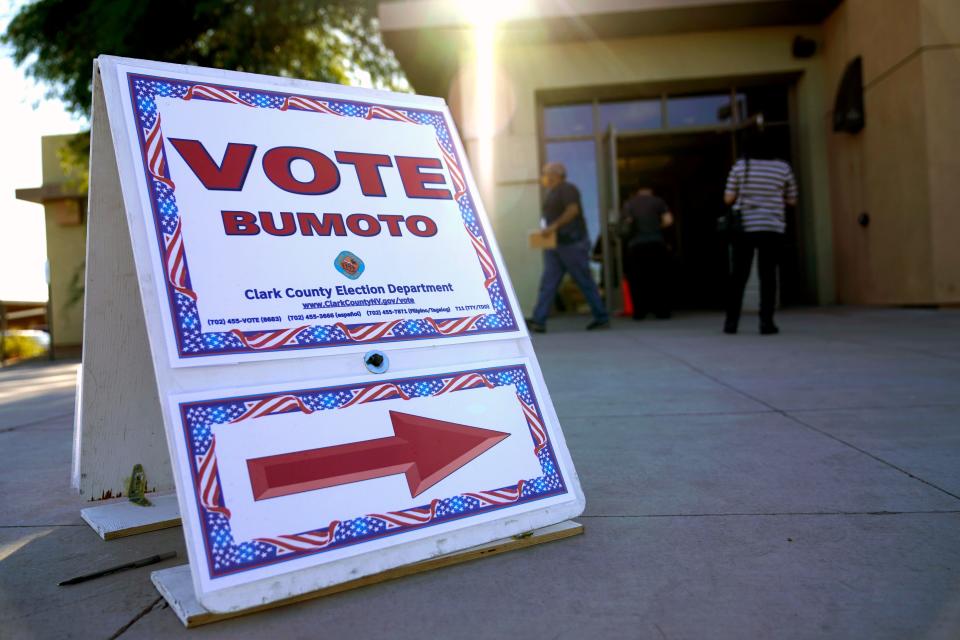
There is a strong focus on passing more restrictive voting laws in response to false claims that the 2020 presidential election was stolen, Carter said.
"I think you can draw some connections between states that are battleground states and the laws that are being passed," she said, drawing parallels between the states where former President Donald Trump sought to overturn the election results in Michigan, Georgia, Arizona, Pennsylvania, Wisconsin and Nevada.
Carter added that these states are sites for significant amounts of legislative activity related to voting. State legislators often use election misinformation and claims of election fraud to justify making voting harder, fueling a wave of restrictive voting legislation, she said.
"Now, going into 2024, we're expecting election deniers to focus their tactics on the same battleground states," she said.
Mail-in voting has become one target for those who claim election fraud. The Brennan Center found 11 laws that reduce access to mail voting that passed in several states this year:
Four add more stringent voter ID requirements.
Three prohibit election workers from sending unsolicited mail ballot applications or ballots.
Four shorten the period for requesting or casting a mail ballot.
Two ban the use of drop boxes.
One makes it a crime to return a mail ballot on behalf of another.
Nearly half of states pass expansive voting laws
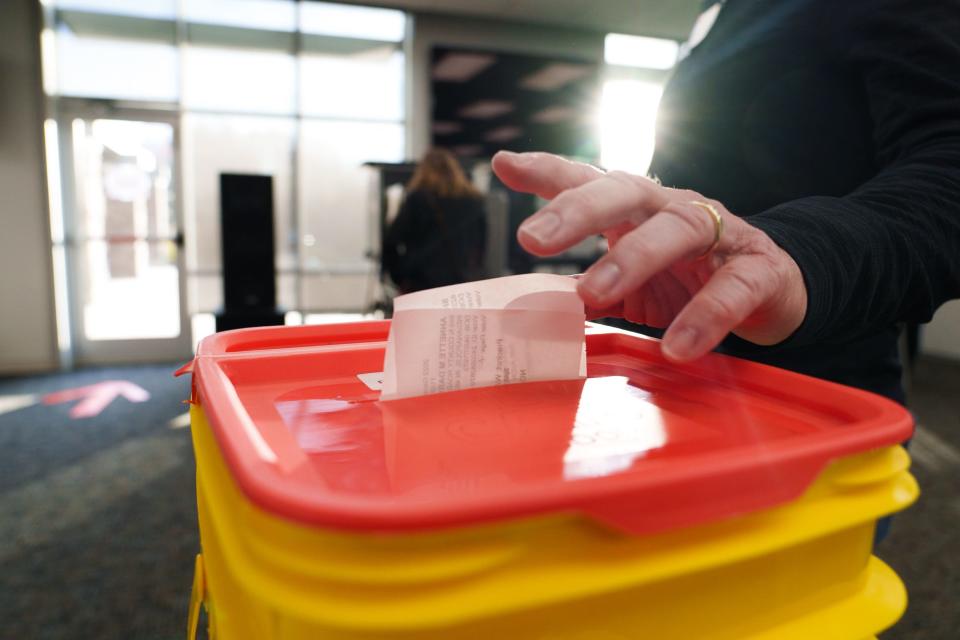
At least 23 states enacted 47 expansive voting laws in 2023 including several battleground states like Michigan, Minnesota, Nevada and New Mexico.
A new voting law in Michigan now grants voters an extra nine days for early voting, creates easier vote by mail options and improves access to drop boxes. One law in Nevada makes permanent expanded mail-in ballot rules.
In New York, a new law requires jails to provide voter registration forms to individuals that are being released. It also requires high schools to distribute voter registration forms to students.
Colorado has passed a law with provisions that improve opportunities for in-person voting on Indian reservations and establishes drop boxes at places of worship. It also requires mandatory polling locations on college campuses as well as requires drop boxes at campuses with 1,000 students or more.
"The wave of pro-voting legislation that we did see this year ... follows the 2022 midterms where voters largely rejected election-denying candidates in swing states," Carter said.
Democrats and Republicans are watching several races in these states that were decided in 2022 by narrow margins.
In Michigan, Democrats are hoping to win back one district held by GOP Rep. John James, a freshman lawmaker who won by a narrow margin of 1,600 votes last year. They are also eyeing a handful of races in New York where first-year Republican lawmakers won by narrow margins in the last election.
Also in New York, Republicans are looking for a pick-up opportunity in a district held by Democratic Rep. Pat Ryan, who won by a single-digit margin.
In Colorado, Republican Rep. Lauren Boebert almost lost her seat last year after businessman Adam Frisch came close to unseating her with just 550 votes separating the two candidates.
What does it mean for 2024?
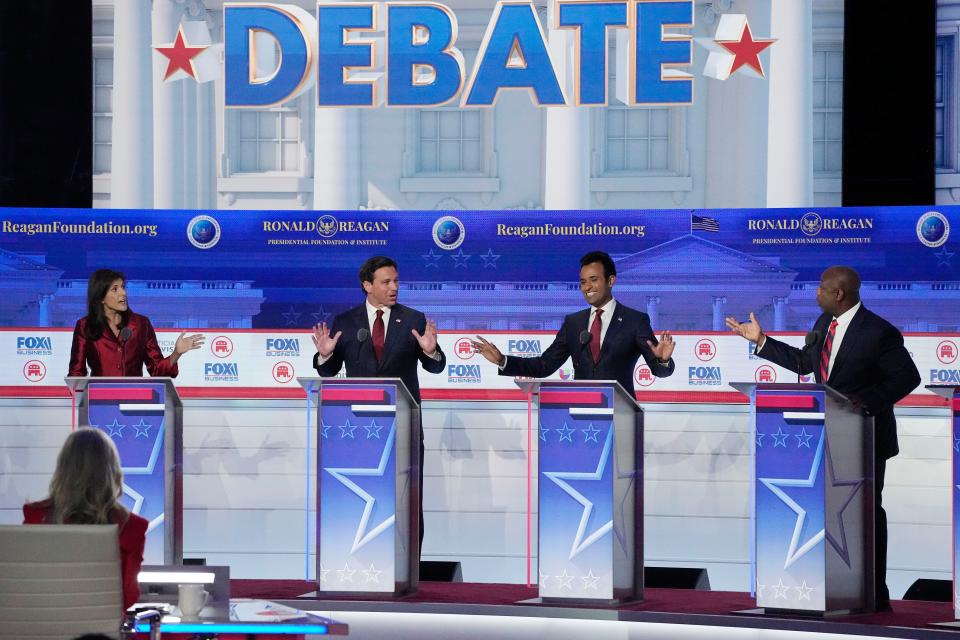
Voting rights advocates say the changes to restrictive voting laws may play into effect for determining the outcome of 2024, pointing to states where the 2020 outcome was determined by less than 2 percentage points.
"Lawmakers and election conspiracy theorists – two groups with increasing and concerning overlap – will undoubtedly make their mark on the 2024 presidential election," Voting Rights Lab's Liz Avore said. "The outcome of the 2024 presidential election will come down to how voters and election officials respond."
The changing laws also can be confusing for voters.
"These are quite complicated and we talk about a sort of modern-day literacy test almost," the ACLU's Lakin said. "Some of these rules really are like that."
This article originally appeared on USA TODAY: These states passed new 2023 voting laws. Here's what it means for 2024

